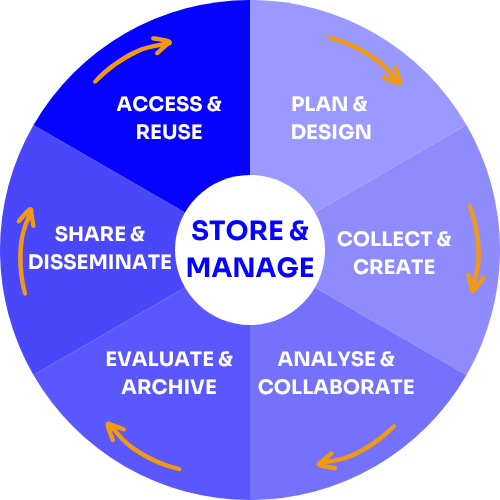

The 'research data lifecycle' refers to the various stages that research data goes through from its initial creation or collection to its final archiving or disposal. This lifecycle encompasses the processes and activities involved in managing and handling research data throughout its existence.

The life cycle of research data.
(Adapted from the Research DataLifecyle by LMA Resesarch Data Management Working Group, CC BY-NC 4.0 DEED)
There are other representations of the research data lifecycle that have more or less components, or slightly different titles to each component. This covers
| Plan & Design | Proper documentation is crucial for understanding and reusing data. This stage involves creating a Data Management Plan (DMP) which involves data security, data storage, planning for sensitive data, and awareness of institutional and funder policies. |
| Collect & Create | Data gathering, deciding on data types and formats, data access, metadata standards to describe the context, structure, and content of the dataset, and data organisation. |
| Analyse & Collaborate | Researchers perform data cleaning, transformation, and statistical analysis to derive meaningful insights from the collected data, and then documenting each action. |
| Store & Manage | Data needs to be stored securely and backed up to prevent loss. |
| Evaluate & Archive | Not all data needs to be kept forever. Data appraisal, data storage, archiving data and disposing of data. |
| Share & Disseminate | Researchers share their data with others in the scientific community to encourage collaboration, transparency, and reproducibility. Sharing can occur through data repositories or other platforms. |
| Publish & Reuse | Some research data may be published alongside research findings to provide transparency and support the reproducibility of results. |
Managing the research data lifecycle effectively is essential for promoting Open Science, reproducibility, and the responsible conduct of research. Additionally, adherence to ethical and legal standards, such as data protection and privacy regulations, is crucial at each stage of the lifecycle.
If you are new to Research Data Management (RDM) it will involve more planning at the outset, but the rewards will be preparedness and a clear understanding of your needs and path forward.
UGent Open Science: Knowledge clip: The research data lifecycle. (5:21)

